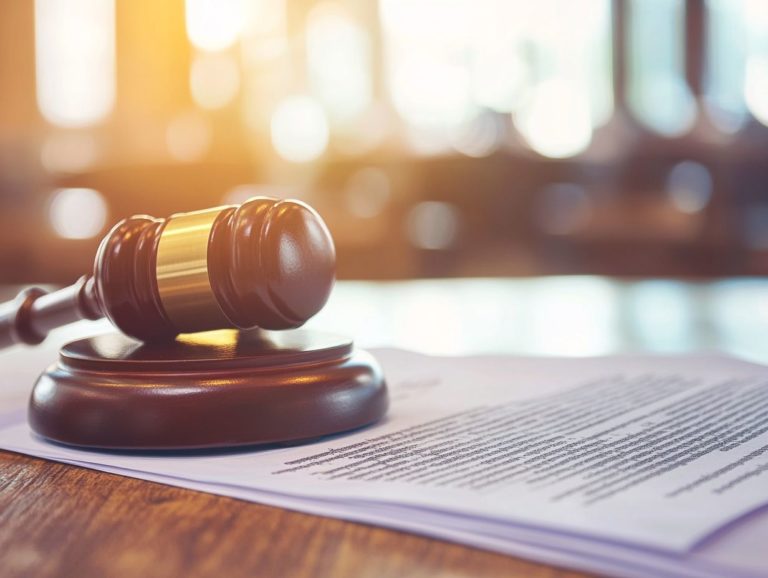Understanding the Role of the Court in IP Litigation
Intellectual Property (IP) serves as a cornerstone of innovation and creativity, meticulously safeguarding the rights of creators and inventors like you.
This article delves into the complexities of IP, unpacking its various types and highlighting the critical role that courts play in resolving disputes. You ll gain insights into everything from jurisdiction and venue to the intricate legal processes involved in litigation, providing you with a clear understanding of what to anticipate in an IP case.
We ll explore the factors that can influence outcomes, which offers you a comprehensive perspective on the landscape of IP litigation. You should know that factors like jurisdiction can make or break your IP case!
Contents
- Key Takeaways:
- The Role of the Court in IP Litigation
- El proceso legal del litigio de PI
- Factors Affecting the Outcome of IP Litigation
- Strength of Evidence
- Expert Witnesses
- Judge’s Interpretation of the Law
- Alternatives to Court in IP Disputes
- Mediation and Arbitration
- Benefits and Limitations
- Frequently Asked Questions
- What is the role of the court in IP litigation?
- What cases does the court handle in IP disputes?
- How does the court handle complex technical issues in IP litigation?
- What is the process of filing a lawsuit in IP litigation?
- Can the court order remedies in IP litigation?
- What is the role of alternative dispute resolution in IP litigation?
Key Takeaways:
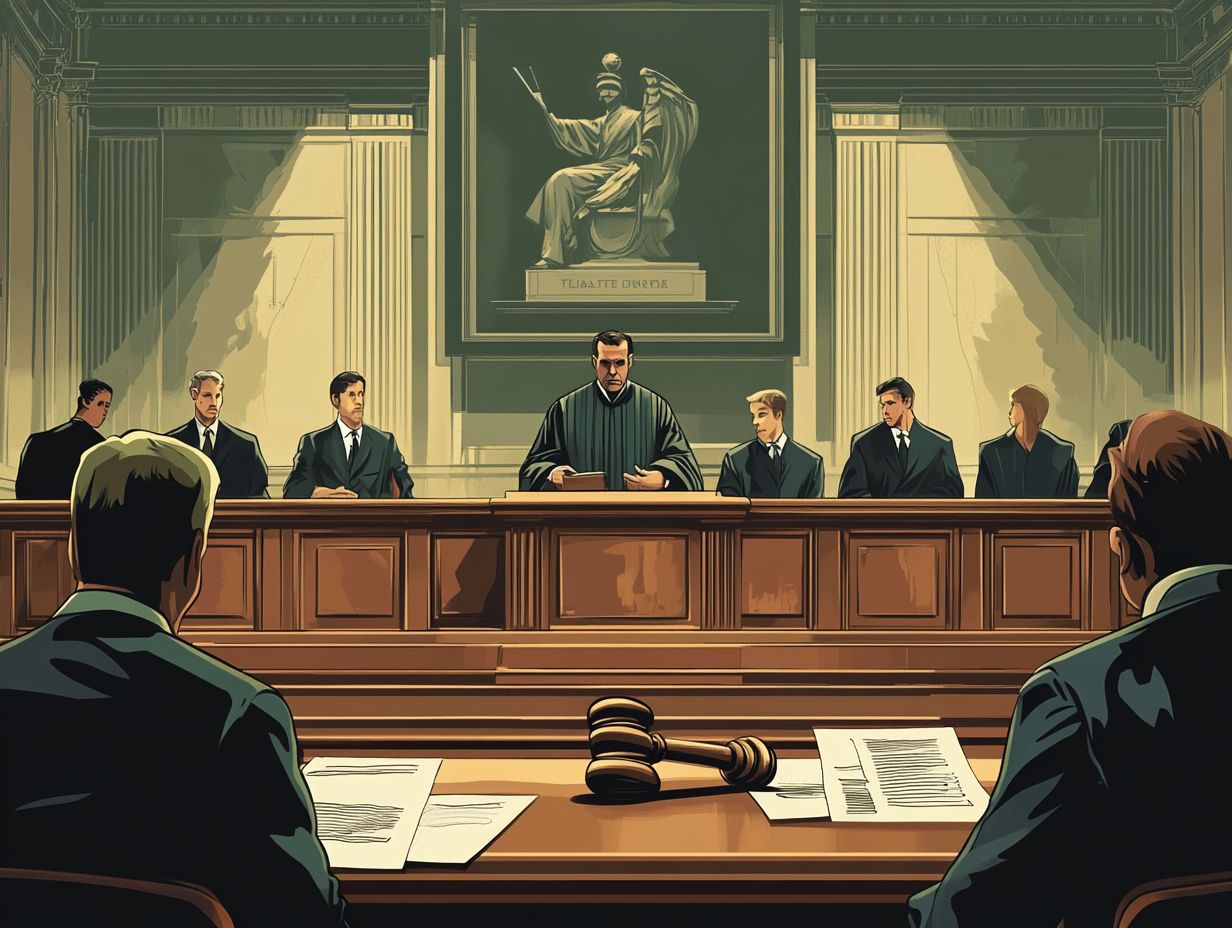
- The court plays a crucial role in resolving disputes related to intellectual property, such as copyright, patents, and trademarks.
- Know that factors like jurisdiction, evidence, expert witnesses, and the judge’s interpretation of the law can greatly impact the outcome of IP litigation cases.
- Mediation and arbitration are alternative methods to resolve IP disputes outside of court, offering benefits like cost-effectiveness and confidentiality.
What is Intellectual Property (IP)?
Intellectual Property (IP) encompasses the legal rights that protect your creative endeavors, whether they be inventions, literary and artistic works, designs, symbols, names, or images used in commerce.
Understanding the value of IP rights is crucial. They facilitate innovation and drive economic growth while safeguarding your interests against unauthorized use.
The IP ecosystem serves as a robust framework for enforcing these rights. This ensures that you, as a creator, are rewarded for your contributions to society.
There are various forms of intellectual property, including:
- Patents
- Trademarks
- Copyrights
- Trade secrets
Each form is designed to provide distinct protections tailored to your unique creations. Patents secure your inventions and processes, trademarks guard your brand identifiers, and copyrights shield your artistic expressions.
The importance of securing IP rights cannot be overstated; they offer statutory protections that give you the power to maintain control over your work and monetize your efforts.
Judicial bodies play a pivotal role in this landscape, resolving disputes and enforcing regulations that uphold IP rights. This cultivates an environment where your innovation can thrive without the looming threat of infringement.
Types of IP
You ll find that there are four primary types of intellectual property: patents, copyrights, trademarks, and trade secrets. Each serves a distinct purpose in protecting your innovations and rights.
These categories define the legal framework for safeguarding your creative efforts while outlining the mechanisms through which you can assert your rights. For instance, patents provide you with a legally enforceable monopoly on your inventions for a limited time. This allows you to license your creations and enjoy financial rewards. Just be mindful, as navigating the intricate licensing agreements is crucial to avoid any infringement pitfalls.
Copyrights grant you exclusive rights to reproduce and distribute your artistic works, but it s vital to grasp the varying durations of protection based on jurisdiction. Trademarks solidify your brand s identity, ensuring consumers can easily distinguish your offerings from others in the marketplace.
As for trade secrets, they require diligent measures to keep them confidential, since unauthorized disclosure can severely erode your competitive edge. Don t overlook the role of specialized IP courts; they re essential for resolving disputes and clarifying the rights tied to each type of intellectual property.
The Role of the Court in IP Litigation
The court serves a crucial function in intellectual property litigation, acting as the authoritative body that resolves disputes concerning patent rights, trademark rights, and copyright matters.
Specialized IP courts are tailored to manage these intricate cases, ensuring that legal rights are upheld with both effectiveness and efficiency.
The judicial process in IP litigation is marked by complex civil proceedings, where parties pursue resolution through appropriate remedies, such as statutory damages in infringement cases. This also involves navigating the intricacies of litigation costs and establishing proof of ownership.
Don’t wait! Protect your creations today!
D nde y c mo presentar su caso
Decidir d nde presentar y adjudicar su litigio de propiedad intelectual es fundamental. Dependiendo de la naturaleza de sus derechos de PI y de la ubicaci n de las partes involucradas, podr a tener que recurrir a tribunales especializados en PI o a tribunales federales.
Estos factores pueden influir significativamente en los resultados de sus batallas legales. Diferentes tribunales tienen sus propios est ndares e interpretaciones de las leyes de propiedad intelectual.
Por ejemplo, los tribunales de distrito federal a menudo manejan una variedad de disputas de PI, ofreciendo un enfoque m s general del derecho. En contraste, los tribunales especializados en PI se centran en cuestiones de patentes, marcas y derechos de autor, lo que les permite profundizar en casos complejos.
Navegar estas opciones requiere una mentalidad estrat gica. La elecci n de la competencia puede afectar la composici n del jurado, la velocidad de los procedimientos y la disponibilidad de recursos espec ficos. Estas decisiones pueden moldear el xito de su caso.
Tipos de casos de PI que se escuchan en los tribunales
Los tribunales abordan una variedad de casos de propiedad intelectual, incluyendo infracci n de patentes, infracci n de derechos de autor y de marcas. Cada uno presenta consideraciones y implicaciones legales distintas.
Tambi n encontrar que casos de competencia desleal y publicidad enga osa caen dentro del mbito del litigio de PI, mostrando la diversidad de disputas que surgen en este campo.
Estos casos a menudo navegan a trav s de complejos marcos legales establecidos por leyes como la Ley de Patentes, la Ley de Derechos de Autor y la Ley Lanham para marcas.
Por ejemplo, un caso de infracci n de patentes eval a si un producto o proceso utiliza ilegalmente una invenci n patentada, lo que podr a resultar en sanciones financieras importantes para el infractor.
En cambio, la infracci n de derechos de autor se centra en la reproducci n o distribuci n no autorizada de obras creativas, resaltando la necesidad cr tica de proteger la expresi n art stica.
Las disputas de marcas giran en torno a la posible confusi n entre los consumidores sobre las identidades de marca, un factor clave que puede influir en las decisiones del tribunal. Los resultados de estos casos no solo establecen precedentes legales, sino que tambi n tienen importantes implicaciones para empresas y creadores.
El proceso legal del litigio de PI
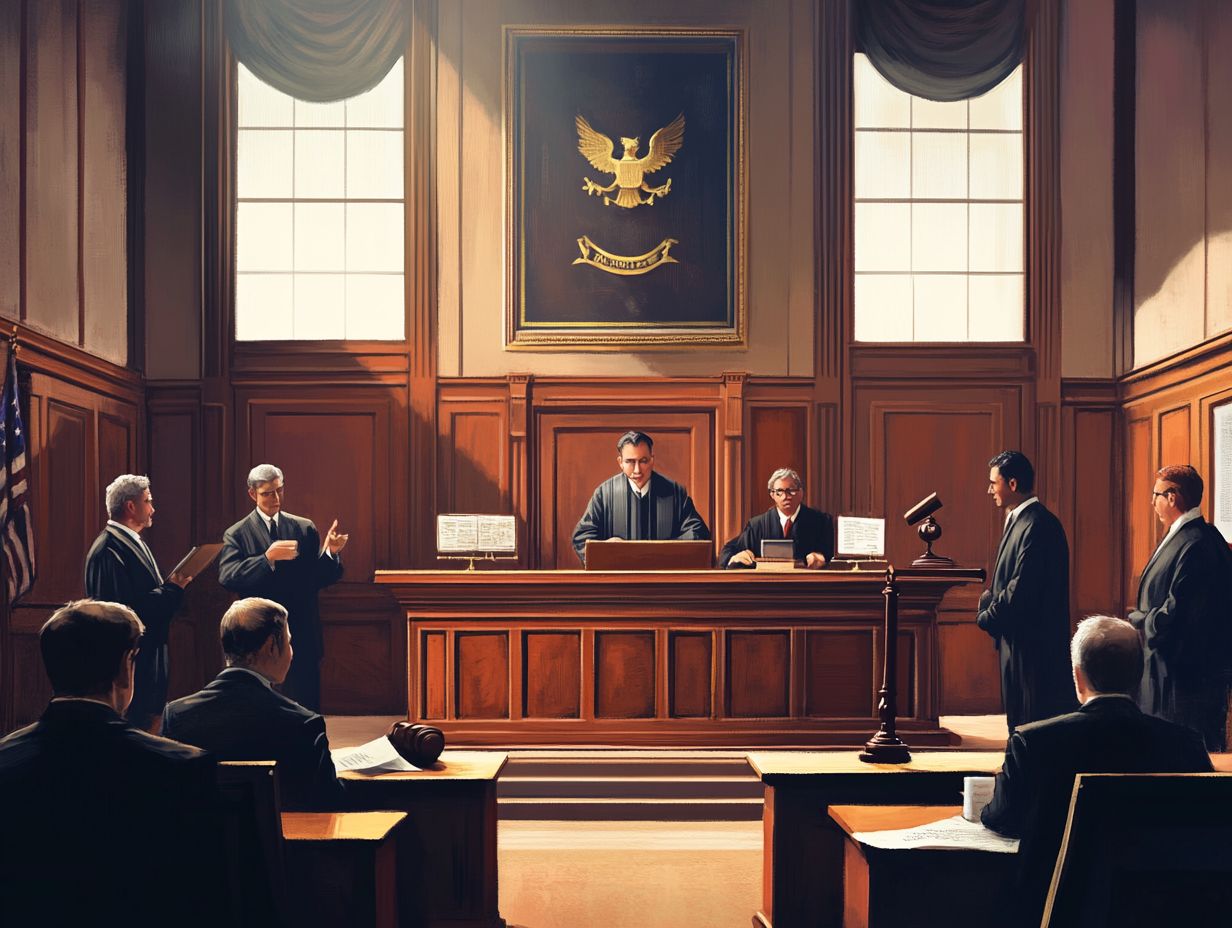
El proceso legal del litigio de propiedad intelectual se desarrolla en varias etapas distintas, comenzando con la presentaci n de una queja en el tribunal correspondiente.
Despu s de esto, navegar a trav s de la etapa de descubrimiento, juicio y, en ltima instancia, juicio final. Cada etapa requiere atenci n cuidadosa a los detalles, mientras re ne evidencia y presenta argumentos convincentes ante jueces experimentados en tribunales especializados en PI.
Dominar estos procesos de litigio es esencial para alcanzar un resultado favorable en su caso.
Presentaci n de una queja
Presentar una queja es el primer paso en los procedimientos civiles de litigio de propiedad intelectual, donde formalmente alegas que tus derechos de PI han sido infringidos. Este proceso requiere una comprensi n profunda de los derechos legales involucrados y la capacidad de proporcionar prueba de propiedad de la propiedad intelectual en cuesti n.
Varios componentes cr ticos deben ser abordados cuidadosamente durante este proceso.
- Una consideraci n clave es adherirse estrictamente a los plazos, que pueden variar seg n la jurisdicci n y el tipo espec fico de PI involucrado.
- Tambi n necesitar s asegurarte de cumplir con los requisitos procesales para la documentaci n, que t picamente incluyen descripciones detalladas de las infracciones y evidencia s lida que respalde tus reclamaciones.
Comprender estos elementos no solo fortalece tu caso, sino que tambi n destaca la importancia de mantener documentaci n legal precisa y oportuna, un aspecto fundamental para proteger tus derechos de propiedad intelectual.
Si enfrentas un problema de PI, consulta a un experto para proteger tus derechos de manera efectiva.
Discovery
Discovery is a pivotal stage in IP litigation where you exchange information and gather evidence to support your claims or defenses. This process includes document requests, depositions formal interviews where witnesses are questioned and identifying expert witnesses who can clarify complex issues surrounding IP rights.
Through this meticulous exchange, you uncover crucial details that could tip the scales in your favor. It’s essential to strategically identify and collect various types of evidence.
Legal rights related to patents, trademarks, and copyrights require specific documents such as licensing agreements and prior art references, which can serve as vital proof.
Expert opinions can illuminate the intricacies of technology or market dynamics, reinforcing your arguments regarding infringement or validity. Thus, the thoroughness of this discovery process significantly influences your case’s trajectory, shaping both settlement discussions and trial outcomes.
Trial and Judgment
The trial phase in intellectual property litigation is where you present your arguments before a judge and possibly a jury ending with a decision that settles your disagreement.
The legal framework, particularly within specialized IP courts, ensures both parties can effectively present their cases. During this critical phase, evidence is your best ally. You ll introduce documents, expert testimonies, and other materials to support your claims.
Witness testimonies can sway the outcome significantly, offering personal insights and clarifications on technical details that might confuse those not well-versed in the subject matter. As an impartial arbiter, the judge evaluates the evidence and arguments presented, guiding the proceedings to maintain fairness and uphold legal standards.
In the end, the trial’s outcome can set important precedents in intellectual property law, influencing future cases and shaping the protection of innovations across various industries.
Factors Affecting the Outcome of IP Litigation
Several factors can profoundly impact the outcome of intellectual property litigation. The strength of your evidence is one of the most crucial elements.
Including expert witnesses boosts the credibility of your claims, while the judge’s interpretation of the law is instrumental in shaping the final judgment.
Strength of Evidence
Strong evidence can be the key to winning your IP case! It establishes the validity of your claims regarding infringement. Proper documentation and proof of ownership are essential for demonstrating the legal rights at stake in these intricate matters.
In these complex proceedings, various types of evidence can be pivotal. Documents such as patents, trademarks, and copyright registrations serve as foundational proof of ownership. Detailed records of prior use and public disclosures can further support your claims.
Witness testimony can shed light on the intentions behind a creation and clarify the relationships among the parties involved. Expert analysis is equally crucial, as specialists can provide valuable insights into the technical nuances of the intellectual property and the alleged infringement.
Collectively, these elements weave together a compelling narrative aimed at persuading the court of your rightful claim.
Expert Witnesses
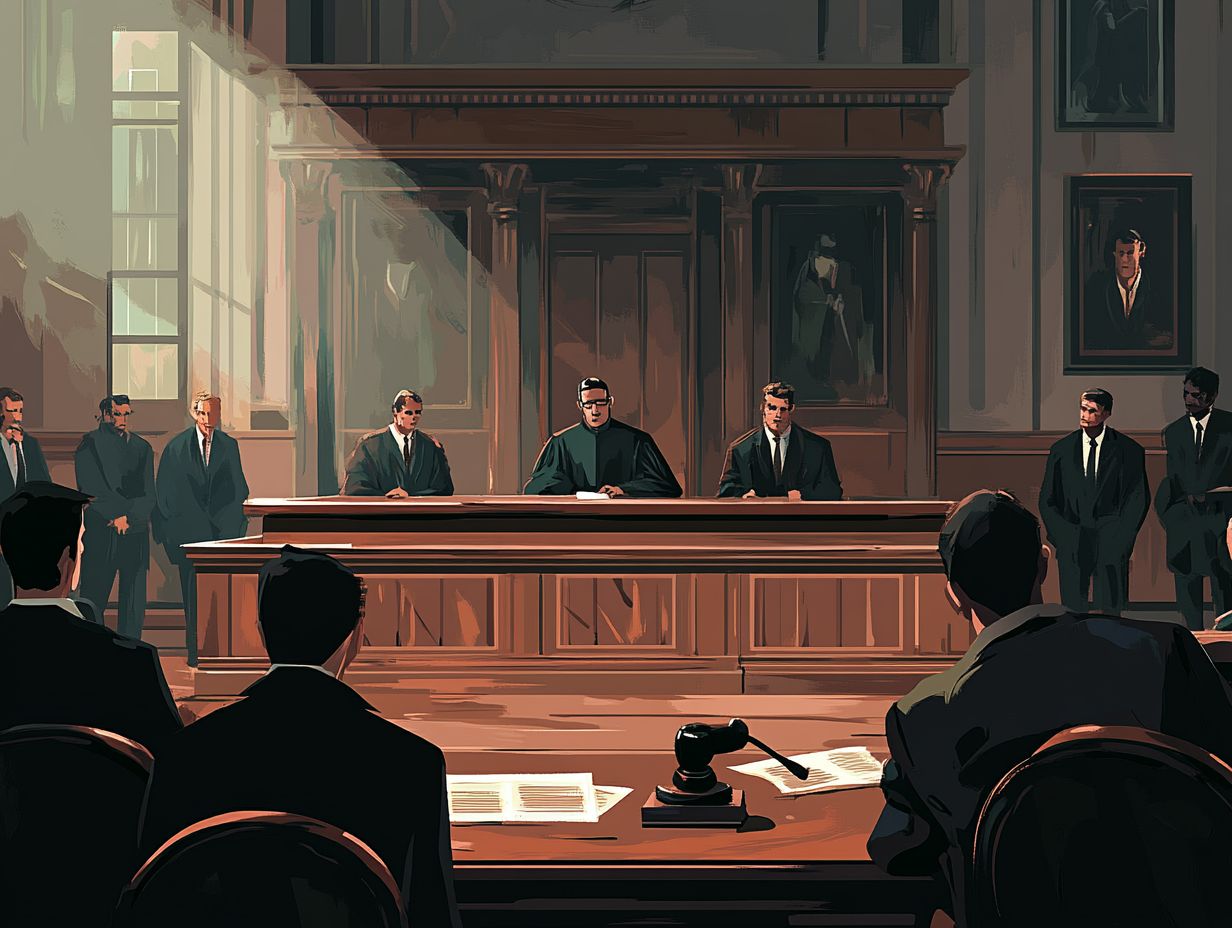
Expert witnesses are critical in intellectual property litigation, offering specialized knowledge that demystifies intricate technical details and enhances the court’s understanding of the case. Their testimonies and reports significantly reinforce the evidence presented throughout judicial proceedings.
To choose the right expert witnesses, legal teams must carefully assess their qualifications, considering relevant experience, publications, and past testimonies. It s essential to gauge their ability to communicate complex concepts in a way that resonates with judges and juries alike.
Throughout the litigation process, these experts conduct thorough analyses and craft detailed reports that clearly outline their findings. Their insights not only clarify technical matters but can also influence decision-making, as the clarity and credibility of their evidence are crucial in shaping the ultimate outcome of a case.
Judge’s Interpretation of the Law
The judge’s interpretation of the law is a pivotal element in IP litigation, significantly influencing how legal rights are perceived and enforced across different legal systems.
Judicial independence is essential, allowing judges to render impartial decisions based solely on the facts presented in court. This impartiality is crucial in shaping the outcomes of intellectual property disputes, where subtle nuances in legal interpretation can make or break the fate of patents, copyrights, and trademarks.
Understanding legal precedents is just as vital. These established rulings create a framework that guides judges in their decision-making.
By meticulously analyzing previous cases, it is possible to better anticipate how courts might rule on similar issues, an especially important skill in the intricate world of IP law.
Thus, having a thorough understanding of both judicial interpretation and relevant legal precedents is critical for anyone navigating the complex landscape of intellectual property rights.
Alternatives to Court in IP Disputes
In terms of resolving IP disputes, consider alternatives to court, such as mediation and arbitration. These avenues offer a way to settle differences outside the conventional judicial framework.
These methods can be more cost-effective and often lead to quicker resolutions. This flexibility allows for tailored solutions that meet the specific needs of everyone involved.
Mediation and Arbitration
Mediation and arbitration present two effective alternatives for resolving intellectual property disputes without the need for litigation. These methods allow for negotiations within a controlled environment, helping to reduce litigation costs.
In mediation, a neutral mediator guides discussions between the parties, enabling individuals to explore options and articulate interests effectively. This process promotes open dialogue and often results in innovative solutions that cater to both sides’ needs.
On the other hand, arbitration involves a neutral arbitrator who resembles a judge, hearing evidence and arguments before rendering a decision that both parties must accept.
The key advantages of these approaches lie in their efficiency and confidentiality, which are especially important in IP disputes where sensitive information is often involved.
Ultimately, both processes empower individuals to resolve issues with greater control and less formality than traditional court proceedings.
Benefits and Limitations
- Benefits: Mediation and arbitration present significant advantages for resolving IP disputes, including cost efficiency and expedited timelines.
- Limitations: One major drawback of arbitration is the lack of an appeals process, which can be concerning for those who are particularly mindful of their legal rights.
- Mediation may not always yield a binding resolution, potentially leading to frustration if a mutually agreeable outcome remains elusive.
- These alternative methods might lack formal structure, which could leave some individuals feeling that their arguments haven’t been fully leveraged.
However, it s worth noting that both mediation and arbitration can foster a more collaborative environment, allowing you to maintain ongoing relationships a critical aspect in many IP matters.
Consider these factors to find the best approach for your needs.
Frequently Asked Questions
What is the role of the court in IP litigation?
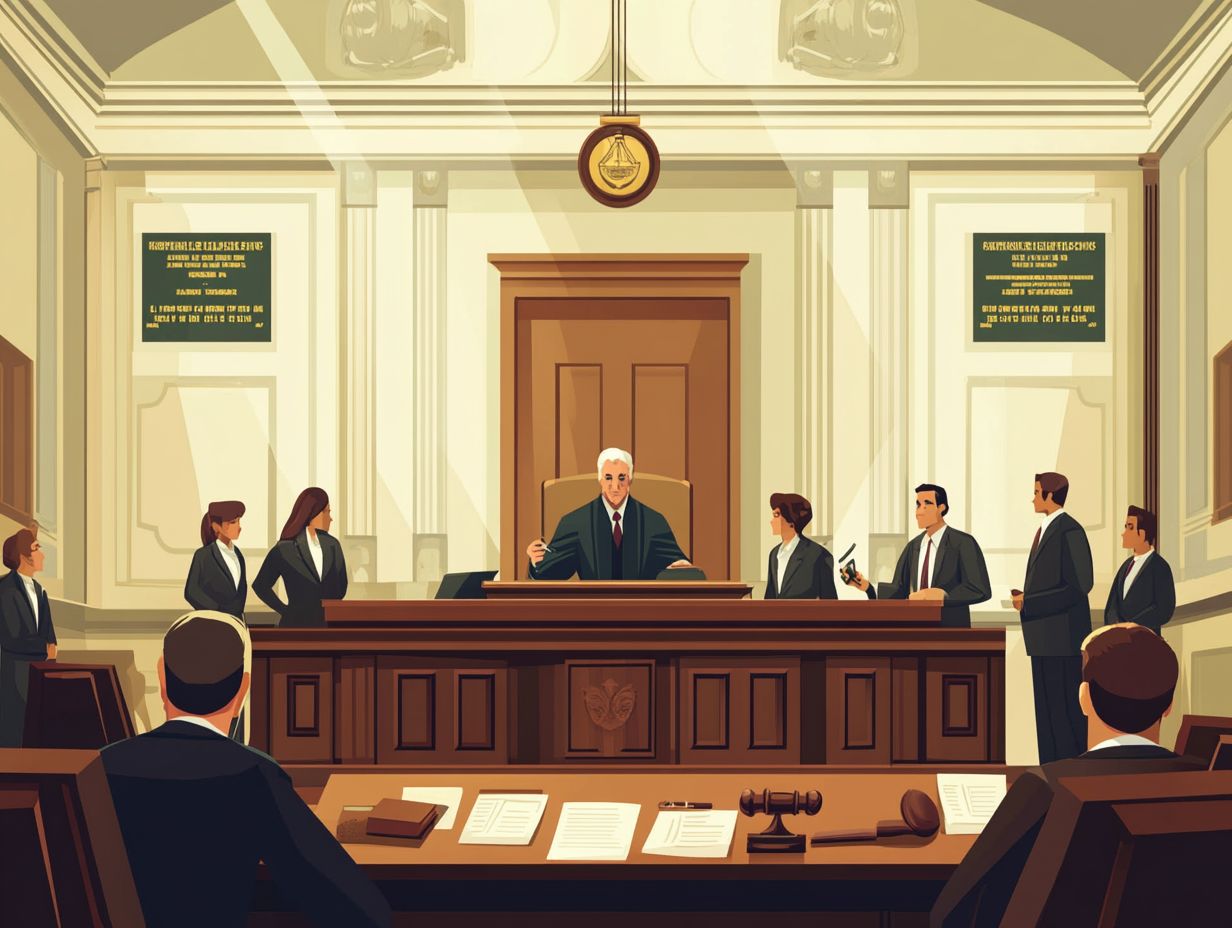
The role of the court in IP litigation is to review the legal claims made by both parties in a dispute over intellectual property rights. The court acts as a neutral third party and makes a decision based on the evidence and arguments presented by each side.
What cases does the court handle in IP disputes?
The court has jurisdiction over cases involving disputes over patents, trademarks, copyrights, and trade secrets. These can include claims of infringement, ownership, and validity of the intellectual property in question.
Act quickly to choose the right method for your IP dispute! For personalized advice, consider seeking professional legal assistance based on your situation.
How does the court handle complex technical issues in IP litigation?
The court may appoint experts to help understand complex technical issues in IP litigation. Judges often have technical advisors to assist with the details of a case.
What is the process of filing a lawsuit in IP litigation?
Filing a lawsuit in IP litigation begins with drafting a complaint that outlines your legal claims. The court will then schedule pre-trial procedures, such as discovery and motions, before the case goes to trial.
Can the court order remedies in IP litigation?
Absolutely! The court can order powerful remedies like injunctions, monetary damages, and royalties. These actions are crucial for compensating the injured party and stopping further infringement of their intellectual property rights.
What is the role of alternative dispute resolution in IP litigation?
Alternative dispute resolution methods, such as mediation or arbitration, can effectively resolve disputes outside of court. Some cases must go through these methods before trial, while others can choose to use them for a quicker settlement.




